Abarth 500 595 695 VS Hyundai Kona
Abarth 500 595 695
The Abarth 500, particularly in its 595 and 695 renditions, captures the spirit of Italian motoring with its compact yet aggressive design. Known for its lively performance and distinctive styling, this little powerhouse is a joy to drive, offering an engaging experience that appeals to enthusiasts. With its rich motorsport heritage, the Abarth 500 embodies the essence of fun and excitement on both the streets and the race track.
more informationHyundai Kona
The Hyundai Kona blends a bold design with a versatile interior, making it a standout choice in the compact SUV market. Its crisp handling and responsive steering provide an engaging driving experience, whether in the city or on the open road. The vehicle also offers a range of features designed to enhance comfort and connectivity, ensuring a pleasurable journey for both driver and passengers.
more information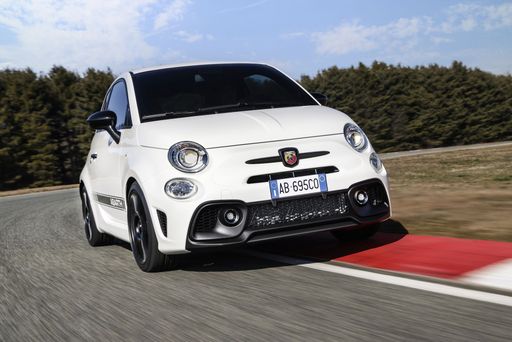 @ media.stellantis.com
@ media.stellantis.com
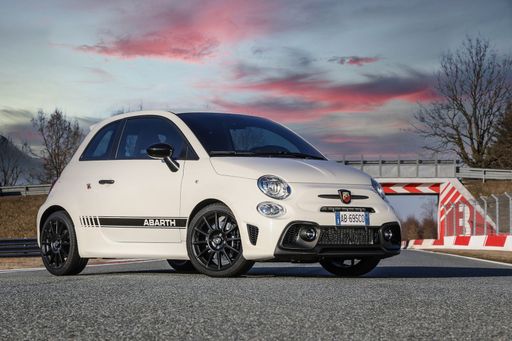 @ media.stellantis.com
@ media.stellantis.com
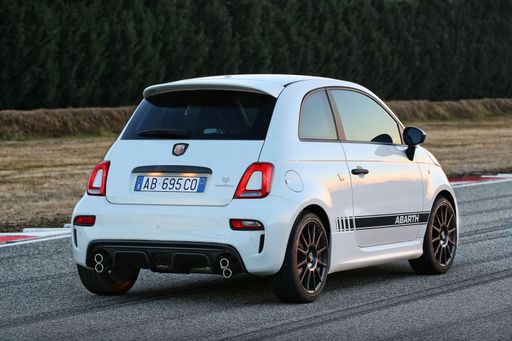 @ media.stellantis.com
@ media.stellantis.com
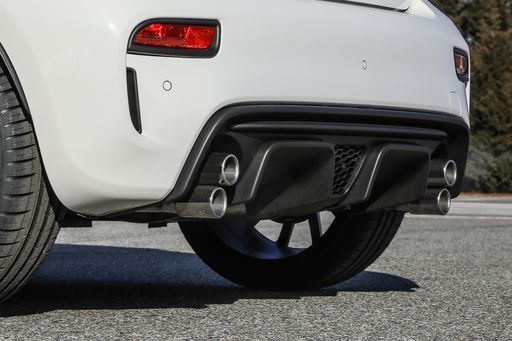 @ media.stellantis.com
@ media.stellantis.com
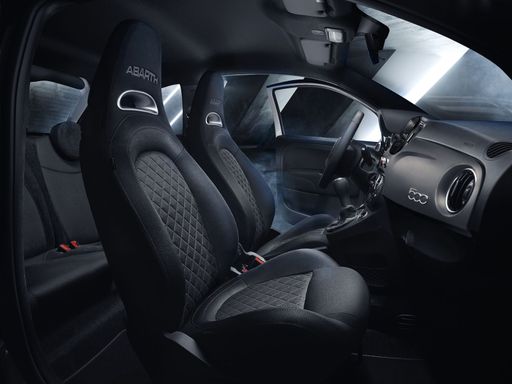 @ media.stellantis.com
@ media.stellantis.com
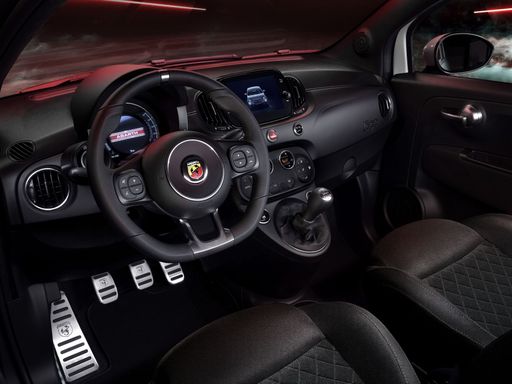 @ media.stellantis.com
@ media.stellantis.com
 @ hyundai.news
@ hyundai.news
 @ hyundai.news
@ hyundai.news
 @ hyundai.news
@ hyundai.news
 @ hyundai.news
@ hyundai.news
Costs and Consumption |
|
|---|---|
|
Price
about 32600 - 39400
£
|
Price
about 22600 - 41600
£
|
|
Consumption L/100km
-
|
Consumption L/100km
4.5 - 6.7
L
|
|
Consumption kWh/100km
17.2 - 18.9
kWh
|
Consumption kWh/100km
14.6 - 16.8
kWh
|
|
Electric Range
242 - 265
km
|
Electric Range
377 - 514
km
|
|
Battery Capacity
37.8
kWh
|
Battery Capacity
1.3 - 65.4
kWh
|
|
co2
0
g/km
|
co2
128, 103, 141, 152, 0
g/km
|
|
Fuel tank capacity
-
|
Fuel tank capacity
38 - 47
L
|
Dimensions and Body |
|
|
Body Type
Hatchback
|
Body Type
SUV
|
|
Seats
4
|
Seats
5
|
|
Doors
3
|
Doors
5
|
|
Curb weight
1410 - 1435
kg
|
Curb weight
1370 - 1773
kg
|
|
Trunk capacity
185
L
|
Trunk capacity
466
L
|
|
Length
3673
mm
|
Length
4350 - 4385
mm
|
|
Width
1682
mm
|
Width
1825
mm
|
|
Height
1518
mm
|
Height
1580 - 1585
mm
|
|
Payload
370 - 385
kg
|
Payload
420 - 490
kg
|
Engine and Performance |
|
|
Engine Type
Electric
|
Engine Type
Petrol, Full Hybrid, Electric
|
|
Transmission
Automatic
|
Transmission
Manuel, Automatic
|
|
Transmission Detail
Reduction Gearbox
|
Transmission Detail
Manual Gearbox, Automat. Schaltgetriebe (Doppelkupplung), Reduction Gearbox
|
|
Drive Type
Front-Wheel Drive
|
Drive Type
Front-Wheel Drive, All-Wheel Drive
|
|
Power HP
155
HP
|
Power HP
100 - 218
HP
|
|
Acceleration 0-100km/h
7
s
|
Acceleration 0-100km/h
7.8 - 13.3
s
|
|
Max Speed
155
km/h
|
Max Speed
162 - 208
km/h
|
|
Torque
235
Nm
|
Torque
200 - 265
Nm
|
|
Number of Cylinders
-
|
Number of Cylinders
3 - 4
|
|
Power kW
114
kW
|
Power kW
74 - 160
kW
|
|
Engine capacity
-
|
Engine capacity
998 - 1598
cm3
|
|
Top speed
155
km/h
|
Top speed
162 - 208
km/h
|
General |
|
|
Model Year
2023
|
Model Year
2024
|
|
CO2 Efficiency Class
A
|
CO2 Efficiency Class
D, C, E, A
|
|
Brand
Abarth
|
Brand
Hyundai
|
Abarth 500 595 695
The Abarth 500 has long been regarded as a significant name within the compact performance car segment, blending iconic Italian styling with impressive performance. The latest iterations, namely the Abarth 500 595 and 695, along with the 500e electric model, continue this tradition. Enthusiasts and everyday drivers alike are drawn to their sporty ethos and cutting-edge technologies.
Abarth 500: A Fusion of Style and Performance
The Abarth 500 boasts a distinctive design that is instantly recognisable. Its compact dimensions, measuring 3673 mm in length and 1682 mm in width, ensure it retains that quintessential city car appeal while still providing an eye-catching presence on the road. The aggressive stance and sporty enhancements reflect Abarth's racing heritage, making it a desired choice for performance aficionados.
Powertrain Innovations
At the heart of the Abarth 500 lineup lies an efficient electric powertrain that produces a substantial 155 PS (or 114 kW). This power is delivered through an automated transmission, ensuring seamless gear changes and an engaging driving experience. The inclusion of a reduction gearbox allows for rapid acceleration, achieving 0-100 km/h in just 7 seconds, making it competitive in its class.
Exceptional Efficiency and Range
One of the standout features of the Abarth 500e variants is their impressive energy efficiency. Depending on the model, the energy consumption ranges between 17.2 and 18.9 kWh/100 km, showcasing Abarth's commitment to sustainability without compromising performance. With an estimated range between 242 and 265 km on a single charge, the Abarth 500e models are well-equipped for both urban commutes and longer journeys.
Technical Specifications at a Glance
The Abarth 500 595 and 695 models feature a robust torque output of 235 Nm, offering responsive acceleration and confident overtaking capabilities. The maximum speed is electronically limited to 155 km/h, providing a thrilling driving experience while maintaining safety standards. Additionally, the vehicle's lightweight construction, with a total weight between 1410 kg and 1435 kg, further enhances agility and handling.
Thoughtful Interior and Practicality
Inside, the Abarth 500 is crafted for both comfort and functionality. Accommodating up to four occupants, the interior remains practical despite its sporty intentions. A boot capacity of 185 litres ensures that the vehicle is not just about speed but also everyday usability. Innovative technology features include a user-friendly infotainment system that integrates seamlessly with smartphones, enhancing the driving experience further.
Conclusion: The Future of Abarth
With the Abarth 500 595, 695, and the innovative electric 500e models, Abarth continues to strive for a perfect balance between performance and efficiency. These vehicles not only reflect the brand's rich heritage but also pave the way towards a more sustainable future in automotive engineering. Each drive in an Abarth 500 promises to be a spirited affair, delivering excitement and innovation mile after mile.
Hyundai Kona
The Hyundai Kona: A Comprehensive Overview
The Hyundai Kona has established itself as a standout in the compact SUV segment, blending innovation with performance and style. As the automotive world moves towards more sustainable and efficient options, the Kona offers a variety of powertrains, from traditional petrol engines to full hybrids and all-electric models.
Powertrain Options and Performance
The Hyundai Kona's powertrain choices cater to a wide range of preferences. For petrol enthusiasts, the Kona offers a 1.0L T-GDI engine, delivering 100 PS, and a more robust 1.6L T-GDI variant with up to 170 PS. Those looking for efficiency without sacrificing power can consider the full hybrid model, offering 129 PS and an impressive consumption of 4.5 L/100km.
For a greener option, the all-electric Kona provides a compelling case. With battery capacities of up to 65.4 kWh, the electric Kona offers power outputs of 156 to 218 PS, and efficiencies as low as 14.6 kWh/100km, enabling an electric range of up to 513 km.
Technical Specifications and Innovations
Built on a robust platform, the Kona delivers versatility and reliability. With a choice between manual or dual-clutch automatic gearboxes, along with options for front-wheel or all-wheel drive, the Kona ensures a tailored driving experience. The handling is enhanced by the car's lightweight construction, balancing a 1370 to 1773 kg curb weight with dynamic performance.
The Kona's design doesn't compromise cargo space for style; it offers a generous 466 L boot capacity. With a relatively compact body, measuring 4350 to 4385 mm in length, the Kona easily navigates urban environments while still commanding a strong road presence with its 1825 mm width.
Efficiency and Eco-Friendliness
Hyundai is committed to reducing emissions, as evidenced by the Kona's CO2 efficiency ratings, which range from class A for electric models to class D for some higher-performance petrol variants. The focus on reducing environmental impact without sacrificing driving pleasure is notable throughout the Kona range.
Costing and Value
The Hyundai Kona offers commendable value for money. Pricing starts at €26,400 and reaches up to €50,690, depending on the chosen configuration. The monthly running costs range from €956 to €1090, with a cost per kilometre of 38.3 to 43.6 cents, making it a competitive option in its class.
Conclusion: Modern, Efficient, and Versatile
The Hyundai Kona stands as a testament to Hyundai's commitment to innovation, efficiency, and practicality. Whether you are inclined towards a traditional combustion engine, a hybrid for a balance of power and efficiency, or a full electric model for maximum eco-friendliness, the Kona provides a tailored solution for each unique driver preference.
